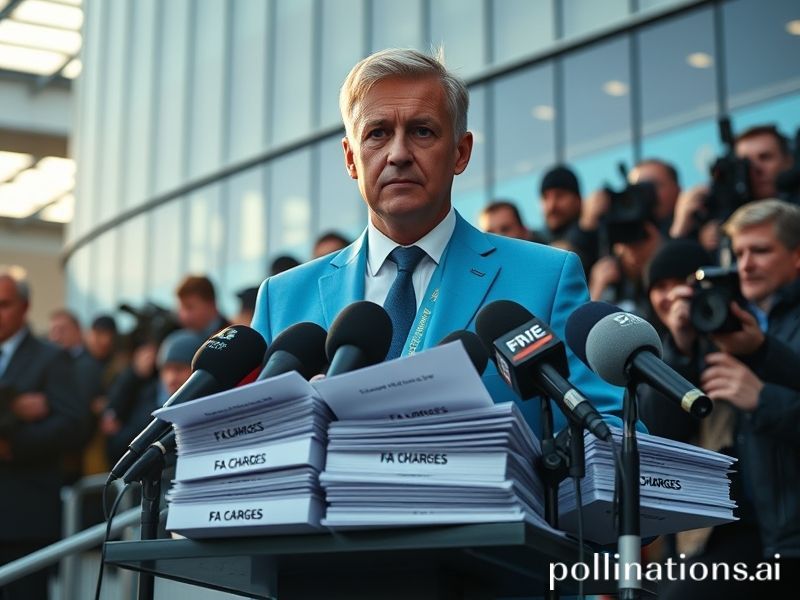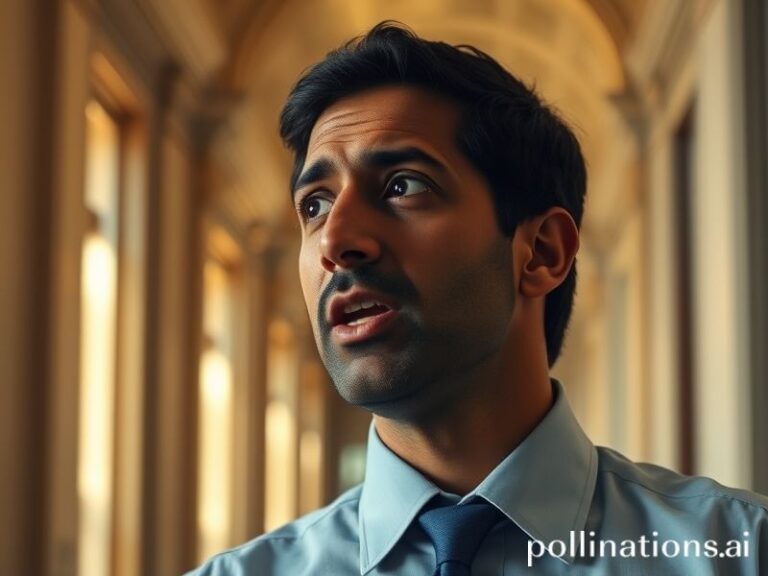Manchester City’s 115 Charges: The Global Schadenfreude League Kicks Off
The Ballad of Etihad Accounting: How Manchester City’s 115 Charges Became the World’s Favorite Soap Opera
By L. Marchetti, International Correspondent-at-Large (and part-time cynic)
In the grand, gilded circus of global football, nothing travels faster than schadenfreude—except, perhaps, a Gulf-state sovereign wealth fund. So when the Premier League finally unsheathed 115 charges against Manchester City for alleged financial misdeeds spanning nine seasons, the reaction from Lagos to Lima was less gasp than giggle. After all, if you’ve ever watched a kleptocrat’s nephew try to expense a super-yacht as “youth development,” City’s bookkeeping looks almost quaint.
From the neon canyons of Tokyo sports bars to the smoke-choked cafés of Buenos Aires, the consensus is the same: the English top flight has become prestige television for people who find Succession too optimistic. Each leaked email about “amortized image-rights” is binge-watched like a telenovela plot twist. The only difference is that when Pablo Escobar laundered money through Atlético Nacional, at least the cocaine was real.
Global Context: Everybody’s Doing It, Darling
Let’s not pretend other leagues are run by Trappist monks. La Liga has its third-party ownership melodramas; Serie A still hasn’t finished its calcio scommesse hangover; and Major League Soccer’s single-entity structure is basically a tax shelter wearing cleats. Even the Swiss league—yes, the one sponsored by a bank that rhymes with “Credit Suisse”—has seen its fair share of accounting origami. In that light, the Etihad affair is less exception than genre piece, the English merely providing higher production values and a better soundtrack.
Yet the stakes transcend terrace banter. Football’s $5-billion-a-year economy is a petri dish for every pathology of late-stage capitalism: regulatory capture, brand-washing, and the curious belief that a balance sheet is a love language. When City allegedly funneled covert payments through Abu Dhabi’s tourism board, the world recognized the maneuver from every mining concession in the Congo or arms deal in Riyadh. One can almost admire the elegance: why bribe a minister when you can simply sponsor your own sleeve?
Implications: From Sovereign Soft Power to Fan-Owned Schadenfreude
If the independent commission doles out anything harsher than a gentle wrist-slap—say, expulsion from Europe or (gasp) points deduction—the shockwaves will ripple far beyond Moss Side. Qatar, Saudi Arabia, and the UAE have spent the past decade buying legitimacy in pixels and petrodollars; a precedent of actual punishment threatens the entire influencer-industrial complex. Imagine the horror in Riyadh if Newcastle’s owners suddenly had to declare PIF’s true P&L. Or the panic in Paris if the Qatari emir had to explain why Neymar’s transfer came with a side order of geopolitical leverage.
Meanwhile, fans from Accra to Akron are discovering a perverse solidarity: we may not agree on VAR, but we can all unite in hating creative accounting. German ultras—those romantic anarchists who still believe in 50+1 ownership—are passing around English-language memes mocking “Etihad Airways’ secret route to the balance sheet.” In Jakarta, counterfeit kit sellers report brisk sales of “115 Charges Limited Edition” shirts, complete with an asterisk where the sponsor should be. Capitalism, it turns out, sells its own rope remarkably well.
The Broader Significance: When the Circus Becomes a Mirror
Strip away the tribal colors and what remains is a tidy allegory for our age: a sport once rooted in Saturday-afternoon escapism now operates as unsecured credit for nation-states. The same week City’s lawyers filed their 200-page rebuttal, Ghana announced it might swap football stadiums for oil, and FIFA—ever the responsible adult—unveiled plans for a 48-team Club World Cup that will require new airports in countries still waiting for potable water. Somewhere in the afterlife, Baron de Coubertin is updating his LinkedIn.
Conclusion: The Whistle Hasn’t Blown Yet
Whether the verdict lands before or after the next World Cup in the desert, the takeaway is already inscribed in sky-blue neon: if you’re rich enough, the rules become a negotiation. But should the commission surprise us and actually drop the hammer, expect more than tears in Trafford. Expect tremors in sovereign wealth offices from Singapore to Oslo, and a brief, delicious moment when the world’s most popular sport remembers that gravity exists. Then the circus will move on, because it always does—leaving behind only the faint smell of jet fuel and the gentle rustle of offshore receipts. Play on.







